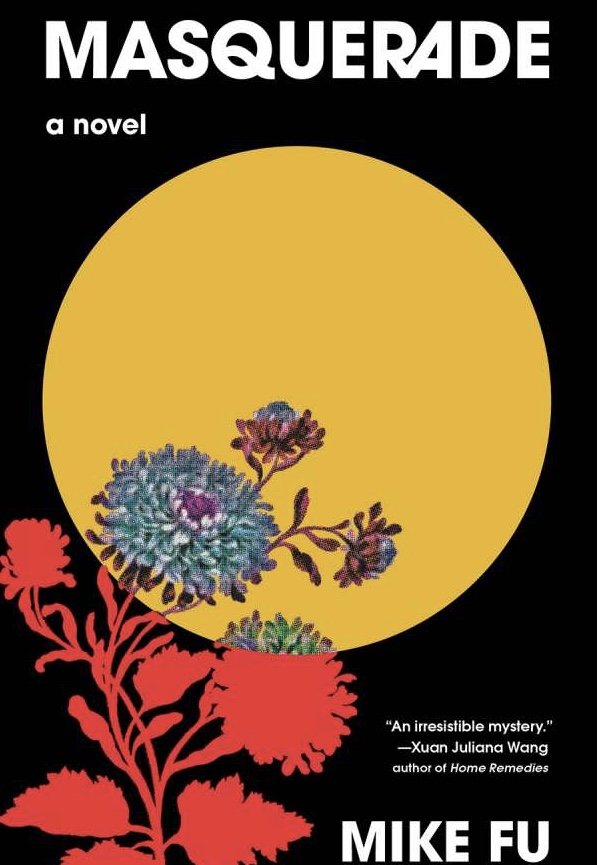Masquerade by Mike Fu (Tin House)
Anyone who has made a round-trip flight across the Pacific knows the price exacted by these hours on a plane. The traveler often loses control of ordinary life at the end of these journeys, sleeping and waking at times far from one’s normal schedule, feeling ravenous hunger at four in the morning, finding the world at large has taken on an unfamiliar, almost hallucinatory, cast. “A legal drug,” Pico Iyer has called jet lag and when mixed with illegal ones or even alcohol, it removes even more controls.
Meadow Liu is well acquainted with jet lag. He’s been flying back and forth between the U.S. and Shanghai once or twice a year since he was ten years old. Even so he’s always felt that “he’s lost a piece of himself on these journeys” and on this latest one he has the feeling that not only is he “intensely disconnected” from everything he knows, he’s become “31 going on 13”.
He has many reasons to feel this way. His entire life has become a liminal space. He was given a job as bartender in a hip Brooklyn hangout after he abandoned his academic career. He was forced to move from his apartment and is now plant-sitting for Selma, an artist who is so perfect she seems like a “splendid illusion.” He was recently ghosted by a man who seemed to be the perfect boyfriend until he vanished without a word of explanation. To cope with his floating existence, Meadow drinks a lot and takes every drug that comes his way.
To complicate things even more, while searching for his passport several hours before his flight, he comes across an old book on Selma’s shelves. Drawn to it because the author and he have the same name, he’s intrigued that the story takes place in Shanghai, where he himself is going. Tossing it into his carry-on, he forgets about it in the flurry of living with his parents as their temporary guest and making contact with Selma who is here to launch an art show.
When he dips into the novel that he borrowed, he’s surprised that he and the narrator seem to be living parallel lives, with each of them attending decadent Shanghai parties. Things become stranger when he returns to Brooklyn. The book disappears and resurfaces at odd intervals. A man who shows up at closing time in Meadow’s workplace warns him to “pay attention to symbols,” an admonition that he later finds is also given to the narrator of the peculiar book. Before this warning is given, Meadow finds a white switchblade that’s been left behind on one of the bar’s tables. The same knife is given to the narrator in the novel.
Selma has mysteriously vanished from Shanghai so Meadow is unable to ask her about the eerie coincidences that he’s found in the book that she owns. Meanwhile his life becomes increasingly bizarre, with a bedroom mirror almost liquefying as he stands before it one sleepless night. He’s followed by strangers as he makes his way through New York. Awakened by pounding on the apartment door one night, he looks out through the peephole and sees Selma standing there, only to have her disappear from view. Confronted with someone who looks disturbingly like him, Meadow follows his double who leads him to an off-off-Broadway theater. A poster near the theater’s entrance has photos of the actors. One of them is the man who ghosted Meadow.
And as his life becomes increasingly unhinged, Meadow finds it’s being replicated, page by page, in the novel written by the man who shares his name.
Is this being scripted and manipulated by Selma, a woman who has always been enigmatic or is Meadow immersed in a form of psychosis that he’s nourished with cocktails, drugs, and jet lag? Is this a puzzle he’s meant to solve or is it a temporary state, a “translucent jelly,” that will eventually fade away?
Mike Fu is a translator based in Japan who in 2019 translated Sanmao’s classic travelogue, Stories of the Sahara (Asia by the Book, April 2021) into English. Masquerade is his first novel, one into which he seems to have poured everything he’s ever observed and experienced. A smart writer and a skillful observer, Fu’s gift of creating atmosphere along with his well-turned phrases (“thunder purred with the malice of a sleeping cat”) make this book a compelling one—with an annoying ending. As the narrator of the novel within this novel concludes, “If any trace of doubt remains--then write this story anew.” Every reader of Masquerade is given a chance to create their own explanation, their own end to the story.~Janet Brown



